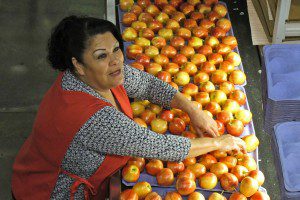 “Growing up on the farms you learn that you take care of your place first, because your place takes care of you,” she tells us. But soemthing tells me that Cheryl Broetje takes this idea much farther than most of us.
“Growing up on the farms you learn that you take care of your place first, because your place takes care of you,” she tells us. But soemthing tells me that Cheryl Broetje takes this idea much farther than most of us.
Faced with some tough decisions about whether to let workers go (in order to collect some insurance money), or to keep the people working, she chose the people. Not only that, she found ways to keep the people working year-round, even though the work on an orchard is more seasonal in nature.
Cheryl and her husband Ralph own and operate Broetje Orchards, a business birthed out of a dream to enable them to help kids in India. Today, the company has over five million trees, and they ship their fruit around the world. But they are the first to admit that the greatest fruit their company produces isn’t apples.
The Broetje’s story oozes faith and redemption. “Sunday school taught us that our whole purpose…was to take care of people, especially the vulnerable,” she tells us. Time after time, they decided to use their business to minister to the people (largely immigrants) and make a difference in their lives for the sake of Christ.
Teaching English as a Second Language
Having an employee-base made up largely of Latino immigrants meant that language became a barrier. The Broetje’s had heard about how some missionaries were using the Bible to teach people English as a second language. So they decided to give it a try. Doing this not only helped to bridge the language barrier, but gave them an open door to talk about things related to their faith.
They found themselves not only better able to communicate with the people, but also developing deeper relationships with them. Keeping with their heart to “take care of the place,” which included the people, the Broetjes began to ask themselves what other needs they might be able to fill.
Providing Child Care
For a variety of reasons, many of the immigrant workers were not able to secure adequate child care. Cheryl tells the story of one family who left their children at home, telling them to not open the door for anyone under any circumstance. It might seem like good advice for children left home alone. That is until a fire breaks out, and the children refuse to open the door for neighbors knocking to get everyone out of the burning building. Fortunately, the childrens’ parents arrived in time to get them out. But this situation revealed a need.
So the Broetjes decided to build child care facility so workers could bring their kids, and know that they are being adequately supervised and cared for while the parents work.
Eliminating Substandard Living Situations
One thing we all know about kids is that thy often speak with less of a filter than adults do. With the workers’ children now in their care, the Broetjes started to hear the true stories about their living sutuations. Some even descried being bitten by rats at night while they slept. How did Cheryl and Ralph respond? They built cleaner, safer living quarters for their workers and their families to live in.
Cheryl speaks of one of the greatest joys she’s experienced was watching families in their new homes practicing English together using the Bible. However, this isn’t something she wanted to stop at the orchards.
Filling an Educational Gap for the Children
One other need they identified was the need to get older children a quality education. So they built a school on their property. Cheryl tells another story of an angry, young 15-year-old boy who came into their school, and years later, he is now a teacher, sowing the same kind of life and knowledge into other children. Over the years, the Broetjes have seen many children leave their school, go on to college, get degrees, and eventually land great jobs making good money and/or having a big impact somewhere around the world.
Their vision to improve the lives of their workers resulted in the fulfillment of probably one of the biggest dreams a worker, especially an immigrant worker, could have… to see their children go on to accomplish big things.
Bearing Good Fruit
Cheryl continues by telling us, “Shaping workers isn’t just about providing quality work on the farm, but it’s also about shaping communities and having an impact far beyond the farm.” While it’s the product their company sells, apples are not the greatest output Broetje Orchards has. Rather it’s merely the vehicle which enabled them to have a greater impact in people’s lives.
The Center for Sharing website (another initiative started by Cheryl Broetje) states, “The majority of Christians in the U.S say they see no connection between their faith and their work.” I think the Broetje’s have set forth a pretty good example.
Lord, I pray for the vision, passion, and creativity for many of us other business owners (and managers) to find ways to have this kind of impact for your Kingdom. Help us to see the opportunities before us to help others, and to BE the Gospel to them. Amen.
Editor’s article was written in response to Cheryl Broetje‘s session titled Shaping Workers: Calling, Valuing, Training, and Empowering at the Faith@Work Summit in Boston on October 24-25, 2014.
[Photo by Bread for the World, used under a creative commons license, sourced via Flickr.]












